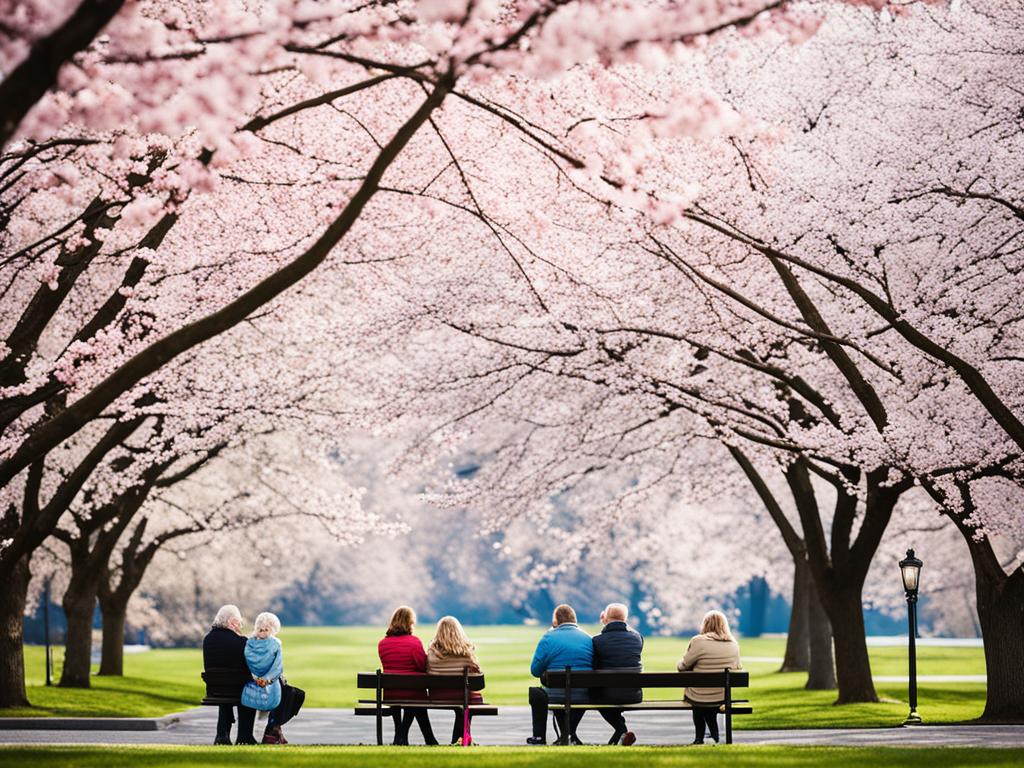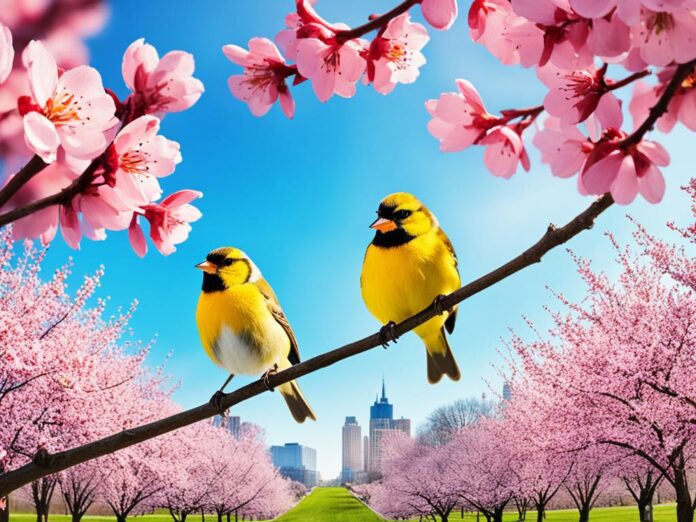As we bid farewell to the cold winter months, I am eager to embrace the arrival of spring. The First Day of Spring 2024, also known as the spring equinox, marks a significant celestial event that ushers in a season of renewal, hope, and growth. This eagerly anticipated day, observed on either March 20 or 21, is filled with cultural traditions, historical significance, and environmental changes.
On the vernal equinox, nature awakens from its slumber, blossoming into vibrant colors and filling the air with fragrance. This remarkable event coincides with Nowruz, the Persian New Year, and other cultural celebrations that emphasize unity, diversity, and the shared beauty of our world. It is a time to embrace the changing seasons and appreciate the wonders of life.
The Astronomical Basis of the Vernal Equinox
The vernal equinox, which marks the First Day of Spring 2024, is a celestial event of utmost importance. It occurs due to the Earth’s tilt and its orbit around the sun. During the equinoxes, including the vernal equinox, the Earth’s axis and orbit align in a way that the tilt neither leans towards nor away from the sun. This alignment causes the sun to be directly over the equator, resulting in equal lengths of day and night.
In 2024, the precise moment of the vernal equinox will denote the official commencement of spring in the northern hemisphere, bringing with it a sense of renewal and rejuvenation for both nature and humans alike.
Throughout history, cultures across the globe have recognized and celebrated the vernal equinox, acknowledging the significance of this astronomical event in marking the transition from winter to spring. The vernal equinox serves as a vivid reminder of the interconnectedness between the celestial bodies and the Earth, weaving together science and spirituality.
Historical and Cultural Significance
The First Day of Spring 2024 holds immense historical and cultural significance. Ancient civilizations aligned their calendars and rituals with the sun’s cycles, particularly the equinoxes and solstices. The vernal equinox represented a time of rebirth and growth after the winter months.
Modern-day traditions, such as the celebration of Easter and the Japanese holiday Shunbun no Hi, reflect the cultural connections to the changing seasons. These festivities highlight the themes of renewal, new beginnings, and the cycle of life.
Art, literature, and music have all been deeply inspired by the vernal equinox throughout history. The concept of balance and the cyclical nature of life often find their way into artistic expressions, capturing the essence of the spring equinox.
From the depiction of blooming flowers in paintings to the use of the equinox as a metaphor for personal growth and transformation in poetry, the vernal equinox has left an indelible mark on the creative endeavors of humanity.
Environmental Impact
The vernal equinox, marking the First Day of Spring 2024, brings about significant environmental changes. With the increasing daylight and warmer temperatures, the natural world awakens from the dormancy of winter. Floral bloom, changes in animal behavior, and the start of agricultural cycles are notable seasonal changes.
As the sun’s rays become more intense, plants undergo a remarkable transformation. Blossoms burst forth, carpeting the landscape with vibrant colors and fragrant aromas. Trees, dormant during the cold winter months, sprout new leaves, providing shade and shelter for a variety of creatures. This spectacle of spring blooms is not only visually stunning but also crucial for sustaining ecosystems and supporting biodiversity.
Furthermore, the vernal equinox plays a vital role in the survival of many animal species. As the days grow longer and temperatures rise, animals emerge from hibernation or undergo migrations to find food, mates, and suitable habitats. Birds return from their winter migration, serenading us with their melodic songs. Bees and butterflies diligently pollinate flowers, ensuring the continuation of plant life and the production of fruits and seeds.
The vernal equinox also has far-reaching ecological importance beyond seasonal changes. It directly influences climate patterns and water cycles. The redistribution of solar energy as the Earth tilts towards the sun leads to the formation of weather systems such as winds, rainfall, and atmospheric circulation. These intricate mechanisms impact regional climates, influencing agriculture, water resources, and the overall balance of ecosystems.
Moreover, the vernal equinox contributes to carbon sequestration, a vital process in mitigating climate change. During photosynthesis, plants absorb carbon dioxide from the atmosphere and convert it into organic matter, effectively removing greenhouse gases from the air. This natural carbon sink helps regulate the planet’s climate by reducing the concentration of atmospheric carbon, thus limiting the greenhouse effect and mitigating global warming.
The ecological importance of the vernal equinox cannot be overstated. It is a catalyst for seasonal changes, sustains biodiversity, supports pollinators, influences climate patterns, and aids in carbon sequestration. As we witness the arrival of spring, let us appreciate and protect the delicate balance of our natural world, recognizing the interconnectedness of all living beings and our stewardship of the Earth.

Observing the First Day of Spring 2024
The First Day of Spring 2024 offers a myriad of opportunities to observe and celebrate the arrival of this rejuvenating season. From awe-inspiring astronomical events to engaging activities and personal reflection, there are numerous ways to embrace the transformative power of spring.
Astronomical Events
One of the most captivating ways to observe the First Day of Spring 2024 is by witnessing astronomical events. Mark your calendar for the total solar eclipse on April 8th, 2024. This celestial spectacle promises a mesmerizing display as the moon passes between the Earth and the sun, casting an extraordinary shadow on our planet. Capture this awe-inspiring moment and marvel at the wonders of the universe.
Activities and Celebrations
The First Day of Spring 2024 calls for festive activities and celebrations to welcome the season with joy and enthusiasm. Attend local festivals, fairs, and flower shows that mark the arrival of spring. Immerse yourself in the vibrant atmosphere filled with colorful blooms, delightful music, and cultural performances. Embrace the sense of community and revel in the beauty of nature’s awakening.
Personal Reflection and Renewal
Spring is a time for personal reflection and renewal. Take a moment to appreciate the beauty of nature’s rebirth. Step outside, breathe in the fresh air, and soak in the sights and sounds of the season. Engage in the tradition of spring cleaning, decluttering your living space to create a sense of renewal and rejuvenation. Embrace this opportunity for self-reflection, setting new goals, and embracing positive changes.
Whether you choose to gaze at the stars, immerse yourself in festive celebrations, or embark on a personal journey of reflection, the First Day of Spring 2024 offers a multitude of ways to connect with the season of renewal. Embrace the wonders of astronomical events, partake in joyful activities, and embrace personal transformation as you welcome the arrival of spring.
Key Takeaways
- The First Day of Spring 2024, also known as the spring equinox, is a celestial event marking the beginning of the season.
- It falls on either March 20 or 21 and symbolizes the awakening of nature and the human spirit.
- Nowruz, the Persian New Year, is celebrated on this day, highlighting unity and cultural diversity.
- The vernal equinox occurs due to the Earth’s tilt and its orbit around the sun, resulting in equal lengths of day and night.
- This event has historical and cultural significance, inspiring art, literature, and music about balance, renewal, and new beginnings.
Conclusion
The First Day of Spring 2024 is a momentous occasion that marks the beginning of a new season filled with growth, renewal, and cultural celebrations. This day, also known as the vernal equinox, holds great significance as it signifies Earth’s unending cycle of rebirth.
As we embrace the arrival of spring, let us take a moment to appreciate the environmental impact it brings. The changing seasons bring about remarkable transformations in the natural world, from vibrant floral blooms to the awakening of animal life. This period plays a crucial role in supporting biodiversity, pollination processes, and contributing to climate patterns.
Observing the First Day of Spring 2024 allows us to witness awe-inspiring celestial events, including the total solar eclipse on April 8th, 2024. Attending festivals, fairs, and flower shows that mark the arrival of spring can be a delightful way to immerse ourselves in the beauty of this season. Additionally, engaging in personal reflection and renewal during this time allows us to embrace the transformative power of spring.
As the world welcomes the First Day of Spring 2024, let us unite in celebrating the rebirth of nature, embracing diverse cultural traditions, and fostering a sense of unity and harmony. May this season bring joy, inspiration, and a renewed appreciation for the wonders of our planet.
FAQ
When is the First Day of Spring 2024?
The First Day of Spring 2024, also known as the spring equinox, occurs on either March 20 or 21.
What is the significance of the vernal equinox?
The vernal equinox marks the official commencement of spring in the northern hemisphere. It symbolizes the awakening of nature and the human spirit.
Are there any cultural celebrations associated with the First Day of Spring 2024?
Yes, Nowruz, the Persian New Year, is celebrated on the First Day of Spring with rich traditions and rituals that emphasize unity and the shared beauty of our diverse world.
How does the vernal equinox occur?
The vernal equinox occurs due to the Earth’s tilt and its orbit around the sun. It happens when the Earth’s axis and its orbit align in such a way that the tilt neither inclines towards nor away from the sun. This alignment causes the sun to be directly over the equator.
What is the historical and cultural significance of the First Day of Spring?
The vernal equinox has been of great importance to ancient civilizations, representing a time of rebirth and growth after the winter months. Festivals like Easter and Shunbun no Hi reflect cultural connections to the changing seasons.
How does the First Day of Spring impact the environment and biodiversity?
The vernal equinox brings about significant environmental changes, including floral bloom, changes in animal behavior, and the start of agricultural cycles. It also supports pollination processes, contributes to climate patterns and water cycles, and facilitates carbon sequestration.
How can I observe the First Day of Spring 2024?
You can observe the First Day of Spring by attending astronomical events such as the total solar eclipse on April 8th, 2024. Additionally, you can participate in festivals, fairs, and flower shows that mark the arrival of spring. It is also a time for personal reflection, appreciation of nature, spring cleaning, and embracing new beginnings.
What is the overall significance of the First Day of Spring 2024?
The First Day of Spring 2024 symbolizes the rejuvenation of nature, the human spirit, and cultural traditions worldwide. It is a celebration of Earth’s cycle of rebirth and holds historical, cultural, and environmental importance.

